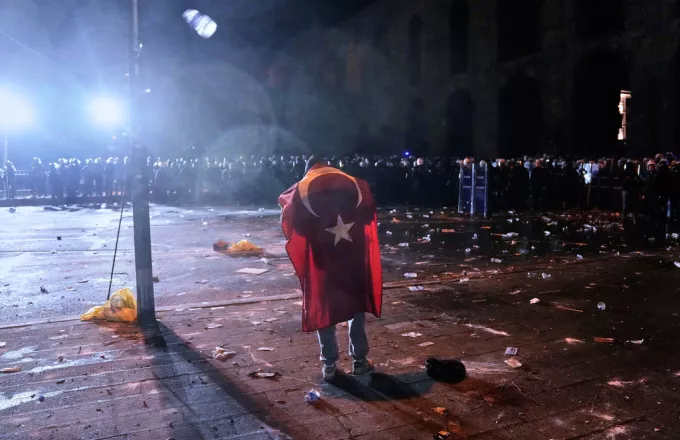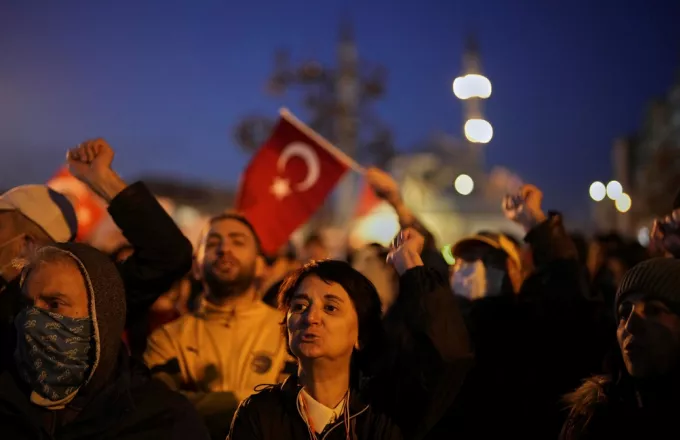Within a few days, what started as a protest over the arrest of Ekrem Imamoglu has evolved into something more important – does history repeat?
When protesters gathered at the City Hall of Constantinople last week, angry at arresting Mayor Ekrem Imamoglu, 26 -year -old Azra said she was initially too scared to defy the ban on rallies. As protests increased in campus cities and cities and towns across Turkey, she could no longer resist her participation.
“Spark in people’s eyes”
“I saw the spark in the eyes of people and the excitement on their faces and I decided that I had to go down here,” He said with a smile, standing between tens of thousands who defied the ban on a concentration to fill the streets around the town hall on Friday night. Despite the crowds, Azra was afraid of retaliation, and refused to give the Guardian his full name. Many protesters were covered, in an attempt to defy face recognition technology but also fearing the tear gas or pepper spray sometimes used by the police. Others were smiling and making selfie to celebrate as fireworks illuminated the night sky.
The arrest of the mayor of Turkey’s largest city in a raid last week was a milestone for the country’s prolonged removal from the Republic. President Recep Tayyip Erdogan’s opponents are afraid that it is a move to oust the only opponent who can beat him in the upcoming elections expected before 2028.
In Imamoglou and more than 100 other people, including municipal officials and the head of the mayor’s construction company, detention warrants were imposed and accused of embezzlement and corruption – accusations that the mayor refuses. He also denies the allegations of terrorism he was recited for cooperation with a pro -Kurdish left -wing political party (DEM) before last year’s local elections, which had great losses for Erdogan’s Justice and Development Party (AKP).
The Justice Minister tried to refute any suspicion that the charges against Imamoglou and other persons from the opposition Republican People’s Party (CHP) were politicized. “The attempt to associate judicial investigations and affairs with our president is, at least, an act of boldness and irresponsibility,” he said.
Within a few days, what began as a protest over the arrest of Imamoglou has evolved into something more important. “This is greater than Imamoglou. This is a struggle for democracy, law and equal rights ”, Azra typically said as the protesters gathered around her.
The Turkish president has long been seeking to regain Constantinople from opposition control, fueling the impetus of protesters who defy the ban on rallies in the city where he began his political career as mayor Erdogan himself. Standing outside a subway station as hundreds of people poured off on the road cheering and shouting anti -government slogans, another demonstrator, named dealer, described the demonstrations as “response to the pressure that has been accumulated for years”.
“There are problems in the economy, in education, in the health system,” he said, having seen the cost of living rising. “We can’t stand this government anymore.”
Proponents of the mayor said 300,000 people were involved in a demonstration in Istanbul on Friday night, while video shows protesters taking to the streets and clashing with police in major cities and cities across the country. Turkish Interior Minister Ali Gerlikaya announced that 343 people were arrested in nine cities after participating in demonstrations.
The Turkish authorities have reinforced their efforts to stifle growing demonstrations, including blocking traffic on two bridges leading to the Town Hall of Constantinople and blocking several roads in the surrounding area with strong forces.
Erdogan expressed his increasing annoyance over appeals for a demonstration by the opposition leader, saying: “Turkey is not a country on the road – it will not be delivered to road terrorism” he expressed.
In a speech on Saturday night, the Turkish President – referring to the crowded rallies – accused the Republican People’s Party of “He tried the fire that broke out in Syria to bring it to Turkey.” According to Erdogan, “The people didn’t hear them …”
What international factor?
Despite the inner anger for Imamoglou’s detention, the international factor remained silent. The most obvious reaction was economic, with the estimates that the Turkish Central Bank spent a record of $ 11.5 billion to support the pound on the day after the mayor was arrested, as investors fled and the currency lost value.
The reactions elsewhere had a much less impact. A spokesman for the UN Secretary -General said he hoped that “the usual rules for proper procedure will be respected”, while US Foreign Ministry spokesman Tami Bruce made it clear that Washington “will not comment on internal decision -making processes”.
US President Donald Trump and Erdogan spoke by phone a few days before the arrest of Imamoglu amid information that the Turkish leader is seeking a meeting at the White House in the coming months.
US envoy in the Middle East Steve Witkov told journalist Trump’s supporter Tucker Carlson that the two presidents’ conversation was “changing the data”, adding that “I think there are a lot of good, positive news coming from Turkey right now.”
“International climate makes Erdogan feel very confident”, said Gonur Tol, an analyst of the Washington Middle East Institute.
“The president of the United States undermines democracy there, which means that the US is looking inside. He just doesn’t care what other foreign authoritarian leaders do to their people. These things really affect a global climate where authoritarianists believe they can do whatever they want. ”
European leaders, who have previously rushed to criticize Erdogan, such as French President Emmanuel Macron, have not yet expressed objections to events in Turkey, in the midst of expectations that they could rely more and more on Ankara to send peace.
“With Trump’s return to the White House and his shift to Russia for Ukraine, Europeans panic and are trying to boost the defense,” Tol. “In this climate where Europe feels that it has to face Russia alone, there is more reason for Erdogan’s involvement.”
European Commission President Ursula von der Laienne became the highest -ranking official who criticized any criticism, stating that Turkey “must protect democratic values, especially the rights of elected officials”.
Is the story repeated?
Sonter Kagaptai, an Erdogan biographer and an analyst at the Washington Institute for the Policy of the Near East, said that such statements are not likely to cause any change.
“There will be no sanctions or exclusion of Erdogan at summits, no one will refuse to include Turkey in future planning. There will be no tangible consequences, because Turkey has been placed on the new international chessboard as an important force, ”he said.
Imamoglu’s party (CHP) will proceed with his proclamation as a candidate for the presidency on Sunday, after a symbolic qualifying vote. Those who were outside the Town Hall insisted that the mayor of Constantinople should remain a candidate for the opposition, even if it means he will be a candidate from prison.
Kagaptai noticed that despite the lack of international criticism, the attempt to cancel Imoglou could return boomerang. Erdogan was imprisoned for a while in the 1990s while being mayor of Constantinople, which strengthened his support and fueled his attempt to enter the central political scene.
“He entered prison as mayor and came out as a national hero,” he recalled.
‘Erdogan bets this will not happen [τώρα] Due to the occupation of the state, its control over institutions and the media and is not worried about international criticism. “
Source :Skai
With a wealth of experience honed over 4+ years in journalism, I bring a seasoned voice to the world of news. Currently, I work as a freelance writer and editor, always seeking new opportunities to tell compelling stories in the field of world news.












